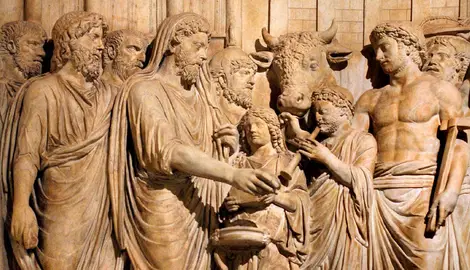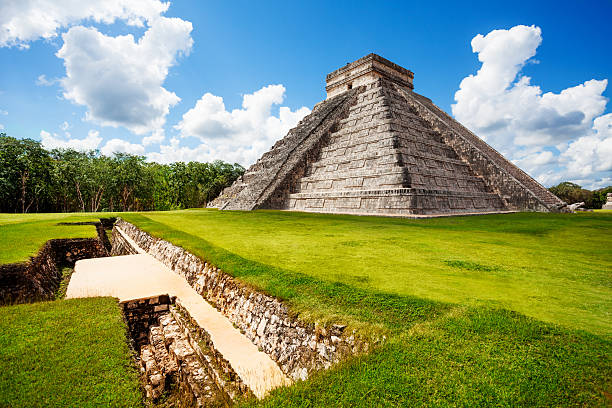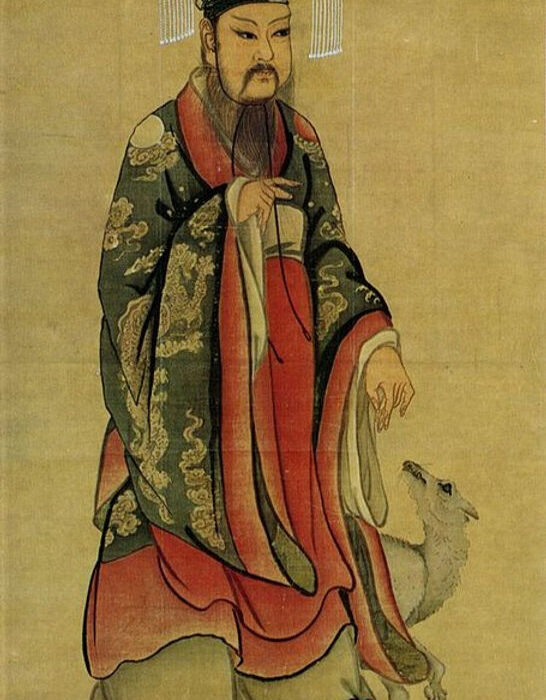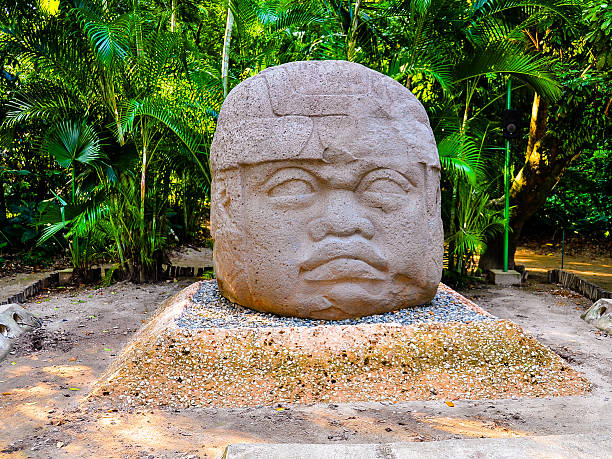Religion in Ancient Rome was never simply a matter of private belief; it was the heartbeat of the city, woven into politics, family, war, and the very rhythm of daily life. The Romans believed that their empire’s success was inseparable from their relationship with the divine. To them, the gods were not distant abstractions but ever-present forces guiding every decision, every harvest, every battle, and every breath of life.
When Romulus, the legendary founder of Rome, ploughed the first furrow of the city’s boundary, it was not only an act of settlement but also a sacred ritual. Religion shaped Rome from its very beginning, and as the empire grew from a small settlement by the Tiber River into the most powerful civilization of its age, so too did its religious traditions.
Roman religion was pragmatic, inclusive, and deeply political. It sought to maintain pax deorum—the “peace of the gods”—ensuring harmony between mortals and the divine. This meant that every ceremony, prayer, and sacrifice was more than devotion; it was a contract with the gods, a way of binding heaven and earth in mutual obligation.
But the story of Roman religion is also one of transformation. What began as a pantheon of countless gods and goddesses rooted in Italic, Etruscan, and Greek traditions would eventually give way to the rise of Christianity, a faith that began on the margins and ended by reshaping the very empire that once persecuted it.
The Gods of Rome: A Pantheon of Power
At the heart of Roman religion was a vast pantheon of deities. Some were inherited from earlier Italic traditions, others absorbed from the Etruscans, and many borrowed and reshaped from the Greeks. The Romans did not see religion as a closed system but as a living one, flexible enough to welcome new gods as the empire expanded.
The most powerful deities were the Capitoline Triad: Jupiter, Juno, and Minerva. Jupiter, the king of the gods, ruled the skies with thunderbolts and divine authority. Juno, his consort, was both protector of the Roman state and guardian of women, especially in marriage and childbirth. Minerva, goddess of wisdom and war, embodied intelligence, strategy, and craftsmanship. Their temple on the Capitoline Hill was one of the spiritual centers of Rome.
Mars, the god of war, occupied a central role as well, reflecting Rome’s martial identity. Unlike the Greek Ares, who symbolized chaotic violence, Mars represented disciplined warfare, honor, and the agricultural fertility that came with peace secured by conquest.
Vesta, goddess of the hearth, symbolized the continuity of the Roman state itself. Her sacred fire, tended by the Vestal Virgins, could never be allowed to extinguish, for it represented the life of the city. Other gods included Mercury, the messenger and patron of commerce; Venus, goddess of love and beauty; Neptune, ruler of the seas; and countless local and household deities who watched over fields, rivers, homes, and families.
What made Roman religion unique was its inclusivity. As Rome conquered new territories, it adopted foreign gods into its pantheon, believing that honoring them could bring divine favor and ensure political stability. The empire became a mosaic of cults and traditions, each adding richness to the tapestry of Roman faith.
Rituals, Sacrifices, and Sacred Duty
Roman religion was not centered on faith or doctrine but on ritual. The correct performance of ceremonies was essential to securing divine goodwill. Mistakes in wording, timing, or gestures could invalidate an entire ritual, so priests often repeated prayers multiple times to ensure accuracy.
Sacrifices were central to Roman worship. Animals—such as bulls, sheep, or pigs—were offered to the gods, their entrails examined for omens. Blood was not spilled casually but as part of a sacred exchange: humans gave to the gods in order to receive their blessing in return. Offerings of wine, incense, and food were also common, symbolizing gratitude and reverence.
Festivals punctuated the Roman calendar, each dedicated to different gods and purposes. Saturnalia, held in honor of Saturn, was a time of feasting, gift-giving, and role reversals, where masters served their slaves in playful inversion of social order. Lupercalia celebrated fertility and purification, while the Parilia honored shepherds and flocks. These festivals were not only religious but also social, uniting communities in shared joy and devotion.
Religion was also embedded in political life. Public officials performed rituals before battles, legislative sessions, or major undertakings. Priests, augurs, and pontiffs held official positions within the state, interpreting omens and ensuring that Rome acted in harmony with divine will. The lines between religion and politics were blurred, for in Rome, they were inseparable.
The Household Gods and Daily Devotion
While the grandeur of temples and festivals defined public religion, private devotion was equally important. Every Roman household honored the Lares and Penates—the guardian spirits of the family and home. Small shrines within houses held offerings of food, wine, and incense, reminding families of the sacredness of domestic life.
The paterfamilias, or male head of the household, led family rituals, passing traditions down through generations. Marriage, birth, and death were all marked by ceremonies designed to keep the family in harmony with the divine order. For the Romans, religion was not confined to the temple but lived out in the intimacy of everyday life.
Religion and Politics: A Sacred Alliance
The Roman state was profoundly religious, and the success of the empire was seen as a direct result of divine favor. Emperors claimed legitimacy not only through military and political power but also through their relationship with the gods.
With the rise of the imperial system, the imperial cult became a cornerstone of Roman religion. Emperors were deified after death, their images worshipped alongside traditional gods. In the provinces, worship of the emperor often blended with local traditions, creating a unifying force across Rome’s diverse empire.
This political use of religion reinforced loyalty to the state but also created tension, particularly when new faiths—like Christianity—refused to participate in emperor worship. To the Romans, such refusal was not merely impiety but rebellion against the state itself.
Mystery Religions and Foreign Cults
Rome’s openness to new gods also meant that “mystery religions” flourished within the empire. These cults, often originating from the East, offered initiates personal salvation, secret rites, and the promise of eternal life—things traditional Roman religion did not emphasize.
The cult of Isis from Egypt, the worship of Mithras from Persia, and the devotion to Cybele, the Great Mother, all gained popularity. These religions attracted those seeking deeper spiritual experiences, especially among soldiers, women, and the marginalized. Their growth reflected a shift in Roman spirituality, from collective ritual to personal transformation.
The Rise of Christianity
Among the many new religious movements in the empire, none would prove as transformative as Christianity. Emerging from the Jewish traditions of Judea, Christianity centered on the teachings of Jesus of Nazareth, who preached love, forgiveness, and the coming of the Kingdom of God.
At first, Christianity was a small sect, often misunderstood and persecuted. Christians refused to sacrifice to the Roman gods or participate in emperor worship, leading to accusations of disloyalty and even treason. Yet despite waves of persecution, Christianity spread rapidly, carried by missionaries like Paul of Tarsus and embraced by diverse communities across the empire.
What made Christianity unique was its universal message. Unlike many cults tied to ethnicity or class, Christianity proclaimed salvation for all—slave and free, man and woman, Jew and Gentile. Its emphasis on charity, community, and eternal life resonated deeply in a world of inequality and uncertainty.
By the third century CE, Christianity had grown into a powerful movement, impossible for the empire to ignore.
Constantine and the Triumph of Christianity
The turning point came with Emperor Constantine. After reportedly experiencing a vision of the Christian cross before battle, Constantine embraced the faith and, in 313 CE, issued the Edict of Milan, granting Christians freedom of worship.
This moment changed the trajectory of Roman religion forever. Within a century, Christianity moved from persecuted minority to imperial religion. The old temples fell into decline, sacrifices ceased, and bishops replaced priests as the leaders of Rome’s spiritual life. By the late fourth century, under Emperor Theodosius I, Christianity became the official state religion of the empire.
The transformation was profound. The gods of Jupiter, Mars, and Venus faded into myth, while the cross rose as the defining symbol of Rome. The empire that once celebrated countless deities now united under a single faith.
Continuity and Change
Yet even as Christianity triumphed, echoes of Rome’s earlier religion remained. Pagan festivals were repurposed into Christian holidays, sacred sites became churches, and many rituals retained a Roman flavor beneath their new Christian meaning. The transition was not abrupt but gradual, a blending of old and new that ensured continuity amidst change.
The story of Roman religion is not one of simple replacement but of evolution. The pragmatic Roman spirit—open to new gods, adaptable to new circumstances—ultimately paved the way for Christianity’s success. In this sense, Christianity did not destroy Roman religion but emerged from its very soil.
Conclusion: From Many Gods to One
Religion in Ancient Rome was as vast and complex as the empire itself. It began with rituals to secure divine favor, expanded through conquest to embrace countless gods, and ultimately gave way to a faith that promised universal salvation.
The journey from Jupiter’s thunderbolts to the cross of Christ reflects not only Rome’s religious transformation but also the human search for meaning, security, and connection to the divine. In the end, the Romans gave the world more than an empire of stone and law; they gave it a spiritual legacy that continues to shape civilizations today.
The story of Roman religion is, at its core, the story of humanity itself—restless, searching, ever-changing, yet always striving to understand the mysteries that lie beyond the mortal world.





